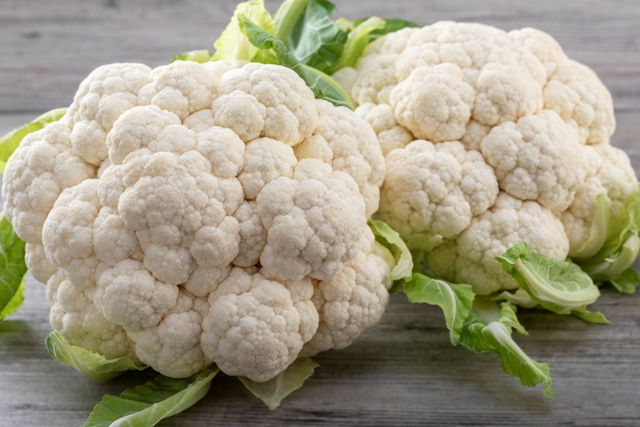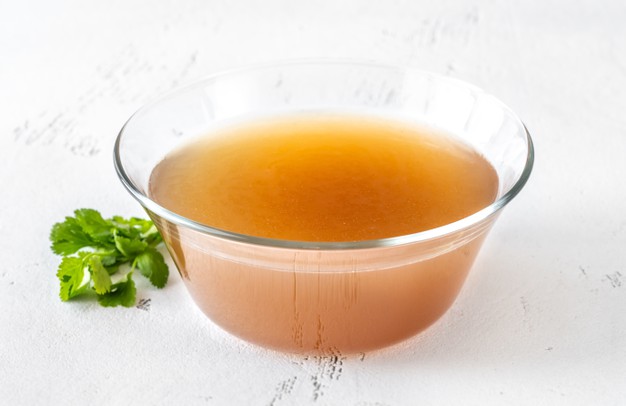Cauliflower is an important cruciferous vegetable belongs to Brassicaceae family. It is extremely nutritious and offers numerous health benefits.
Type
- Cauliflower is widely available in market and it is mainly found in white colour whereas apart from white, green, orange and purple cauliflowers are also found
- Green cauliflower is known as broccoflower
- Whereas the orange coloured cauliflower is known as extremely nutritious and especially rich in Vitamin A
- On the other hand purple cauliflower contains higher amount of anthocyanins (acts as potent antioxidant), which is responsible for imparting that colour
Nutritional profile
- It contains lesser amount of carbohydrates
- It contains adequate amount of fibre
- It contains fewer amounts of proteins as well as fat
- It contains adequate amount of moisture
- It is packed with various important vitamins, which include, Vitamin C, Vitamin B1, B2, B3, B5, B6, B9, Vitamin K and Vitamin E
- It also contains several important trace elements like calcium, phosphorus, sodium, potassium, iron, zinc, copper, selenium, fluoride, magnesium and manganese
- It contains choline as well, which is responsible for stimulating the production of acetylcholine that is involved in signaling the central nervous system and also helps in boosting up the mood as well as the memory
- It is also loaded with sulforaphane that helps in reducing the risk of developing cancers by preventing gene mutation and DNA damages

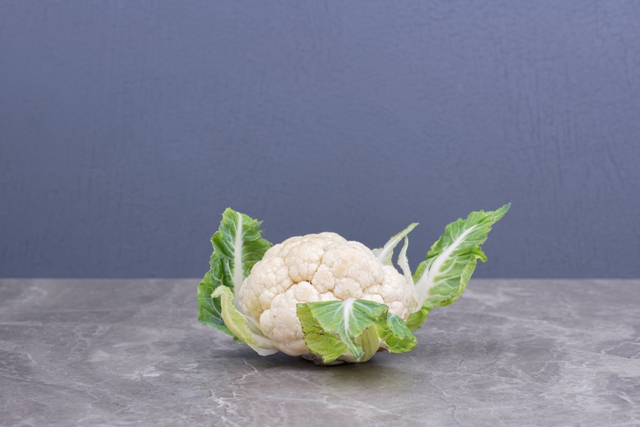
Health benefits
Role on immunity
- It is loaded with various imperative nutrients that boost up the overall immunity of the body
- Its antioxidants, micronutrients and phytonutrients components are accountable for improving the immunological responses of the body, which ultimately strengthen body’s defense mechanism
- Whereas Vitamin C present in cauliflower helps in stimulating the production of WBC, which ultimately helps to reduce the susceptibility of infectious diseases by making the body able to fight against infection
Role on digestive health
- It helps in improving digestion by promoting the elimination of toxins from body
- Fibre present in cauliflower plays important role in improving regularity as it helps in increasing the bulkiness and softness of stool thus helps in easy defecation
- It contains desirable amount of sulforaphane, glucosinolate and glucoraphanin, all of which are responsible for protecting the lining of the stomach thus helps in decreasing the risk of developing peptic ulcer and gastritis
- On the other hand it is also very helpful for resisting the growth of the bacteria H. pylori, which is also responsible for developing peptic ulcer
- Its isothiocyanates components are very useful for preventing various abdominal disorders too

Role on skeletal health
- It plays vital role in strengthening the skeletal system
- Its Vitamin C content is responsible for stimulating the production of collagen, which is responsible for protecting the bones as well as the joints from inflammatory damages as a result reduces the prevalence of arthritis. It is very useful for improving the symptoms of rheumatoid arthritis
- It also contains calcium that helps in mineralizing bones, which ultimately improves bone mass and density
- It contains desirable amount of Vitamin K as well, which helps in synthesizing the proteins required for bone formation
- Moreover consumption of cauliflower is very beneficial for promoting the growth of skeletal system
Role on eye health
- Consumption of cauliflower is very useful for preventing vision impairment
- It is loaded with antioxidants that play vital role in protecting the eye especially the retina from free radical induced oxidative damages that ultimately reducers the risk of developing age related macular degeneration, which is considered as one of the most important leading causes of blindness
- Whereas its sulforaphane component is also associated with protecting retinal tissues from damages as a result helps in promoting vision
Role on fetal growth
- Folic acid present in cauliflower plays vital role in promoting the growth and development of fetus thus it is better to consume it during gestational period
- Its folic acid content is really very effective for boosting up the growth of fetal nervous system
- It is also associated with reducing the prevalence of birth defects thus it should be included in the diet of an expecting mother for ensuring a healthy pregnancy outcome

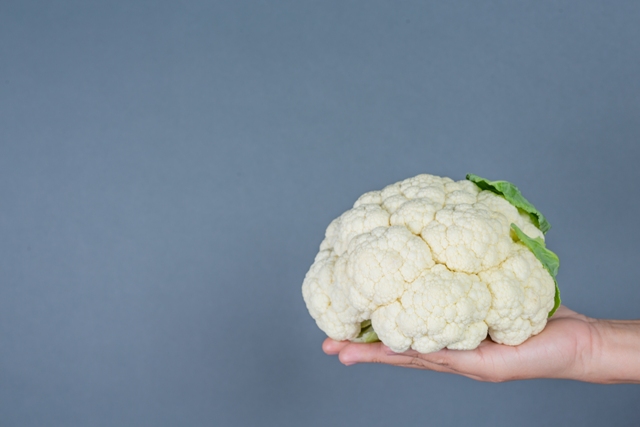
Role on nervous system
- Consumption of cauliflower is very useful for boosting up the overall functionality of nervous system
- Its anti-inflammatory activity plays significant role in delaying the onset of neuro-inflammatory events as a result decreases the prevalence of neurodegenerative diseases
- On the other hand its antioxidant activity helps in preventing the oxidative damages of nerve cells thus promotes their activity
- Vitamin B6 present in cauliflower plays vital role in maintaining the health of brain and promotes the communication between nerves as well
- Consumption of cauliflower is extremely useful for improving the symptom of Alzheimer’s diseases as it helps in decreasing the accumulation of amyloid-beta as well as tau proteins within brain
Role on skin
- Consumption of cauliflower is very beneficial for making the skin healthy and supple as it contains several important nutrients the boost the skin health
- Its sulforaphane component is responsible for protecting the skin from the harmful effects of UV radiation and significantly reduces the prevalence of UV-induced erythema
- It also helps in protecting the skin from inflammatory damages and thus minimizes the risk of developing dermal disorders
- Its antioxidant activity is very much helpful for preventing premature aging too

Role on hair
- Individual who want to obtain a healthy and shiny hair should consume cauliflower
- It contains adequate amount of sulfur-containing amino acids, which are responsible for promoting hair growth as they act as the precursor for synthesizing keratin proteins
- Its silicon content is accountable for improving the shine of the hair as well
- It also helps to make the hair strengthen and strong
Therapeutic uses
It has been extensively used for various therapeutic purposes, like –
- It acts as an imperative therapeutic substance for improving the symptoms of respiratory papillomatosis
- It helps to maintain the electrolyte balance of the body as well
- It is also very effective for decreasing the susceptibility of developing metabolic syndromes
- It is closely related with stimulating the fat burning thermogenesis as a result facilitates weight reduction
- Its fibre content helps in decreasing blood cholesterol concentration thus helps in improving lipid profile
- It helps to heal colitis as well
- It helps in improving cardiovascular health by preventing atherosclerosis. Cauliflower contains indole-3-carbinol abundantly, which exerts potent antithrombotic and antiplatelet activity that contributes to a healthy heart
- Vitamin C present in cauliflower plays vital role in iron absorption thus reduces the prevalence of anemia
- It helps to prevent hypertension as well
- Its indole-3-carbinol component is considered as plant estrogen and can balance hormones by regulating estrogen level. It is also very effective for reducing the risk of developing estrogen induced breast and reproductive cancers
- It also helps in detoxifying the body, by stimulating the elimination of toxins and wastes from body
- It helps to make the body hydrated too

Culinary uses
- It can be consumed after boiling with added salt
- It can also be consumed after frying
- It can be consumed after roasting
- It can be used for preparing soup as well
Risk factors
Excessive consumption of cauliflower may increase the risk of gas formation whereas it may also increase uric acid level as it contains purine thus it is always better to consume it as per recommendation.
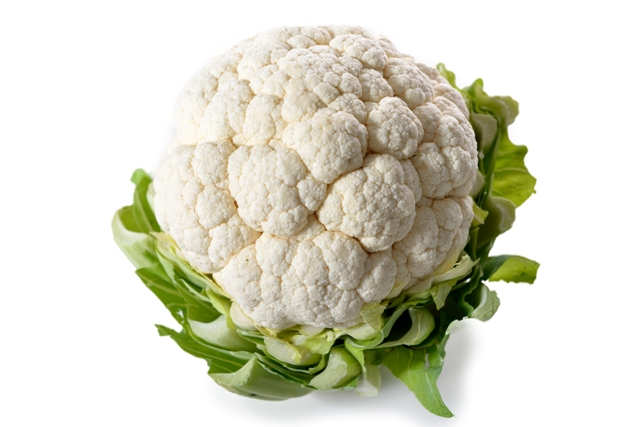
Source:
Ahmed, F.A. and Ali, R.F., 2013. Bioactive compounds and antioxidant activity of fresh and processed white cauliflower. BioMed research international, 2013.
Kapusta-Duch, J., Szeląg-Sikora, A., Sikora, J., Niemiec, M., Gródek-Szostak, Z., Kuboń, M., Leszczyńska, T. and Borczak, B., 2019. Health-promoting properties of fresh and processed purple cauliflower. Sustainability, 11(15), p.4008.
Köksal, E. and Gülçin, İ., 2008. Antioxidant activity of cauliflower (Brassica oleracea L.). Turkish Journal of Agriculture and Forestry, 32(1), pp.65-78.
Picchi, V., Fibiani, M. and Scalzo, R.L., 2020. Cauliflower. In Nutritional Composition and Antioxidant Properties of Fruits and Vegetables (pp. 19-32). Academic Press.
TRAKA, M., 2008. CRUCIFEROUS VEGETABLES INTAKE & HEALTH BENEFITS. Diabetes, 57(10), p.2809e17.
